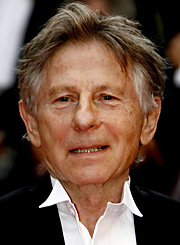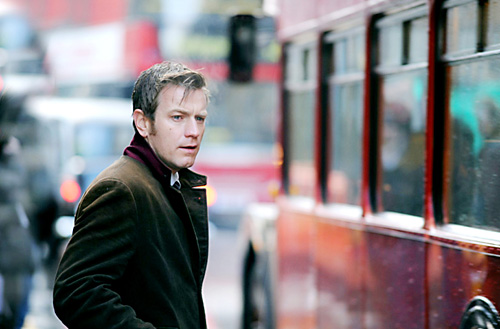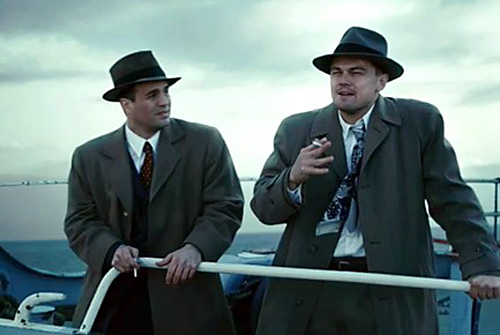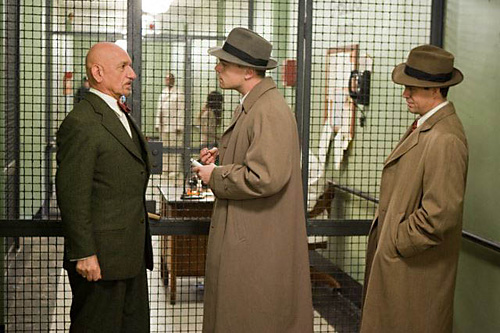|
Roman Polanski finished editing his latest film, The Ghost Writer, while under house arrest.
That stands as ironic commentary, not only on the film itself, but on Polanski's life and career. The story of his childhood has already made one horrific novel, Jerzy Kosinski's The Painted Bird. The events of his adult life—some of them his doing, many of them not--have been emblazoned in 72-point type across tabloid covers for the past 40-odd years.  It is not the purpose of this column to plead either for or against Polanski himself. I cite Polanski's history only to note that paranoia and claustrophobia have been the hallmarks of his films ever since his first feature, Knife in the Water, an unsettling story of the sexual games between a married couple and a young drifter aboard a cramped sailboat on a Polish lake. It is not the purpose of this column to plead either for or against Polanski himself. I cite Polanski's history only to note that paranoia and claustrophobia have been the hallmarks of his films ever since his first feature, Knife in the Water, an unsettling story of the sexual games between a married couple and a young drifter aboard a cramped sailboat on a Polish lake.
Whatever demons closed around Polanski, closed around him early. The same theme of protagonists trapped by situations they cannot control, whether their own minds (Repulsion, The Tenant) or the actual malevolence of others (Rosemary's Baby, Chinatown, The Pianist) has turned up consistently throughout his career. All of these movies served as rehearsal for The Ghost Writer, the most brilliant thriller of Polanski's career. It is the only movie in recent memory to truly merit the adjective "Hitchcockian."
The film—written by Polanski with Robert Harris, on whose novel it is based--opens with a sequence that Hitchcock would have applauded. An auto ferry landing in Martha's Vineyard unloads its vehicular cargo—except for one BMW SUV, which goes unclaimed. The next shot shows the body of the BMW's driver, rolling lifeless in the surf.
The next sequence shows us the eponymous ghost writer (Ewan McGregor), a London hack whose greatest success is a celebrity magician's autobiography—I Came, I Sawed, I Conquered. The ghost—whose name is never given—gets exciting news from his agent (Jon Bernthal): he has been selected to rewrite the memoirs of Adam Lang (Pierce Brosnan), the disgraced ex-Prime Minister of Great Britain.

Soon, however, the ghost finds the assignment is considerably more than he bargained for. Lang, who is persona non grata in Britain for allegedly sanctioning torture in Iraq, lives in an elegantly appointed fortress on Martha's Vineyard with his loyal staff, his security detail and his bitter, cynical wife Ruth (Olivia Williams). Lang's voluminous memoirs are doughy and dull, and Lang himself is the Teflon Man personified, smiling his politician's smile while giving innocuous answers to pointed questions.
Then the going really gets rough: TV newscasters break the story of Lang officially being accused of war crimes. His staff ticks off the countries where Lang can go to avoid extradition: he can stay in the U.S., or go to China, North Korea, Israel, or a few countries in Africa. The Martha's Vineyard fortress goes into lockdown, and Lang flies to Washington in a lame attempt to get the U.S. government behind him, leaving the ghost alone with Ruth. Guzzling chardonnay, Ruth watches mournfully as her husband makes a fool of himself on international television. "He always followed my advice, until now," she says.
The ghost, meanwhile, becomes increasingly alarmed by his own discoveries. First, the previous ghost writer, Lang's longtime aide Mike McAra, was the body in the surf. Second, a series of photographs he finds in McAra's old room suggest that some of Lang's past associations may be more sinister than he is revealing.
From here it is no fair to divulge any more of the plot, except to say that Tony Blair, George W. Bush and their supporters are unlikely to be pleased. It is appropriate to say, however, that The Ghost Writer is the most extraordinary cinematic distillation of Polanski's obsessions to date. Using French and German locations to stand in for the U.S. and British places forbidden him for three decades, Polanski brilliantly makes the world close in on the ghost writer, while at the same time sweeping him up in a vortex of events far beyond the ability of one man to grasp, let alone influence.
Polanski allows the suspense to build slowly but inexorably, avoiding the glacial pace that hampered both Repulsion and The Tenant. It is hard to think of any film since The 400 Blows that has made a windswept beach seem so much like an inescapable trap, and to my knowledge The Ghost Writer is the first film ever to exploit the possibilities of a car's electronic directional system as a vector of suspense. Polanski's style is matter-of-fact, allowing the chills to seep into the story without telegraphing them. His images are crisp and nightmarishly clear: a scene set at an auto ferry dock in a cold, violet twilight is a masterpiece of menacing beauty.
Above all, Polanski has cast the film impeccably. Projecting the boyish cynicism that has served him well since Trainspotting, McGregor makes the perfect outsider, a man without qualities who finds himself challenged far beyond anything he ever expected in his life. Brosnan—yet another proud entry in the list of astonishingly handsome actors who actually know how to act—makes Lang an insinuating mixture of the charming, the mysterious, and the threatening.
Williams gives what is probably the best performance in the film as a woman marinating in sorrow, disappointment, and anger, and who may or may not know much more than she's letting on.
The supporting players are placed like jewels in a crown, all of them chosen for the specific character and sparkle they bring to the whole: Tom Wilkinson as a darkly avuncular Harvard professor, Timothy Hutton as an overly smooth lawyer, Jim Belushi as a hotshot publisher, Eli Wallach as an elderly Vineyard resident with a crucial piece of information: each gives his role precisely the right touch.
The film itself, meanwhile, has obvious reverberations beyond the saga of Tony Blair. It is scarcely a stretch to imagine that Polanski—simultaneous insider and outsider, wanted fugitive and celebrated genius, trapped for thirty-odd years in a luxurious but circumscribed part of the globe—identifies with both Lang and the ghost writer.
Whereas Polanski has made films that are variations on the thriller mode throughout his career, Martin Scorsese has followed a different path. While many of Scorsese's films can be called thrillers, he has rarely if ever made films that rely on the gradual discovery of evidence leading to the solution of a mystery. It is not the detective story, but grand opera, that has formed Scorsese's style: the grandiloquent gestures of characters who are or imagine themselves to be larger than life. Taxi Driver, Raging Bull, GoodFellas, Gangs of New York, The Departed, The Aviator: all depend, to lift a phrase from another context, on shock and awe. Even those Scorsese films that don't fit that mold, such as The Age of Innocence, exist in a rarefied cinematic world where only the deepest dreamers of the cinema—Griffith, Welles, Bergman, Fellini, Michael Powell—have dared to go.
This is why Shutter Island, Scorsese's latest film and his first real attempt to make a classic mystery, is less satisfying than The Ghost Writer. I'm glad I saw Shutter Island before The Ghost Writer, because that allowed me to concentrate on the strong virtues of Scorsese's movie instead on harping on where it falls down.
Laeta Kalogridis' screenplay, based on Dennis Lehane's novel, wastes no time in showing that Teddy Daniels (Leonardo DiCaprio), a federal agent in 1954 Boston, is a troubled individual. We first see Daniels with his head in a ship's toilet, throwing up from seasickness and telling himself weakly to pull himself together. His new partner, Chuck Aule (Mark Ruffalo), is visibly concerned about being teamed with Daniels, not least because of their assignment: to go to Shutter Island, a Boston Harbor prison island for the criminally insane, to search for the escaped child murderess Rachel Solondo.
 |
Once at the hospital—which looks like the setting for one of Vincent Price's Poe outings, complete with brewing storm—Daniels and Aule find the staff, led by Drs. Cawley (Ben Kingsley) and Naehring (Max Von Sydow), less than cooperative. The doctors seem more interested in interviewing Daniels than in being interviewed about Rachel Solondo, and in due course they uncover dire events in Daniels' past—that he helped liberate Dachau, and that his wife Dolores (Michelle Williams) was killed in a fire set by a pyromaniac. What Daniels keeps secret from everyone but Aule, however, is that (a) he believes the pyro is an inmate on Shutter Island, and (b) he believes the Rachel Solondo story is a cover for far more dire goings-on in the hospital. Meanwhile, the patients tell contradictory stories about Rachel Solondo, and nothing at all adds up…
 |
By now the audience has a hint that Daniels isn't exactly a reliable narrator. The story's suspense, however, is sapped to some extent by Scorsese's weakness for overpowering effects. Daniels' arrival at the gates of the hospital, underscored by blatant music and lurid photography, is simply too much, and serves as a harbinger of overdone scenes to follow. This is a far cry from the subtle atmospherics of Polanski and Hitchcock. The solution to Shutter Island's mystery—with its over-reliance on exposition and, in particular, anagrams—also seems clumsy compared with the sudden, brutal grace of The Ghost Writer's end.
Shutter Island has received mixed reviews, which I understand. What I don't understand is the vitriol some critics have flung at its star. One reviewer, giving Shutter Island one-and-a-half stars, spent nearly half her column describing her revulsion for Leonardo DiCaprio, especially how she can't stand such a light, boyish voice emanating from such a hulking, Wellesian presence. This critic's review was unusual in its vehemence, but not in its general thrust. Well, if DiCaprio had lived in the late 1920s, he probably would have suffered the same fate as John Gilbert. But audiences supposedly have become accustomed to variations in leading men's voices in the past 80 years, and DiCaprio has proven many times over that he is one of the outstanding actors of his generation. There is a reason why DiCaprio has become Scorsese's star of choice: in Shutter Island DiCaprio has to portray every conceivable nuance of emotion, and the film's overwhelming sense of tragedy is due mostly to his performance. Yet critics continue to react to him as if he were starring in Titanic over and over and over.
(DiCaprio seems to be a victim of what I call the Kurt Russell Syndrome, named for the actor who has suffered from it most. Certain male performers who rise to fame early, and who in adulthood retain facial or vocal traces of the boys they used to be, tend to get far less critical respect than their colleagues who became famous only after they became men. Reviewers may watch Escape from New York, Silkwood, and Miracle, but they keep seeing The Computer Wore Tennis Shoes.)
Great performances don't exist in a vacuum, and DiCaprio is surrounded by actors as superb as he is. Besides the aforementioned Kingsley, Ruffalo, Von Sydow and Williams, there are excellent performances by Ted Levine and John Carroll Lynch as hospital guards; by Jackie Earle Haley, Elias Koteas, Robin Bartlett and Christopher Denham as particularly unnerving patients; and by Emily Mortimer and Patricia Clarkson, one of whom may or may not be Rachel Solondo. Together these fine actors anchor a film that might, without them, have become overbearing.
|



